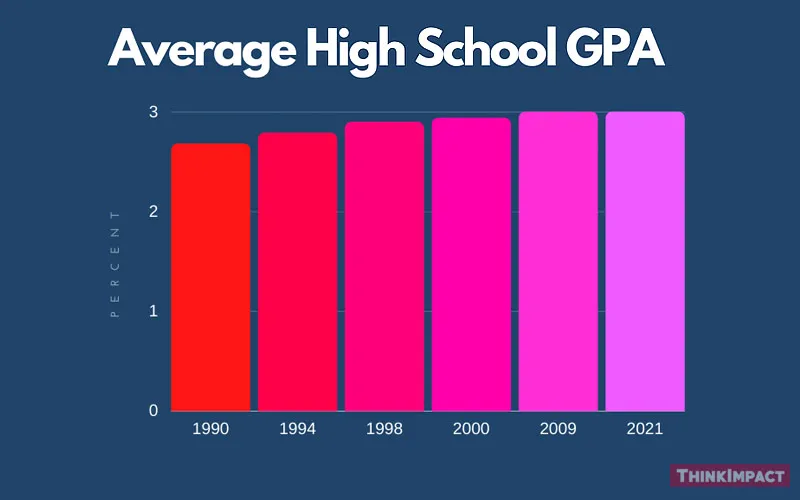Grades hold tremendous importance for college students. Your GPA can impact everything from college admissions decisions to academic probation policies. With so much riding on grades, many students wonder: do colleges round up Grades?
The reality is complex. There is no universal policy on grade rounding. Each college and even individual professor sets their own standards. Some strictly calculate percentages, while others boost borderline grades.
This article explores the nuances behind grade rounding in college. We’ll examine:
- Institutional policies on grading
- Factors influencing professors’ discretion
- How Grade calculations and grading scales work
- The impact on academic performance and GPA
- Strategies for navigating uncertainty
Let’s delve into the grade-rounding debate!
Factors Influencing Grade Rounding
Whether or not a student’s grade gets rounded up depends on several key factors. Colleges don’t use a one-size-fits-all approach.
Understanding these elements provides insight into professors’ decisions on grade rounding.
Some key points about grade rounding in colleges:
- There is no universal policy – each institution sets its own standards.
- Individual professors may have the discretion to round up or not.
- Rounding practices can vary widely even within the same college.
- Grades are more likely to be rounded for general electives than core major courses.
- Strict no-rounding policies are more common in advanced and graduate-level courses.
College Grading Policies
The first factor is the college’s grading policies. Most institutions publish guidelines on:
- Minimum grade percentages for letter grades
- Use of plus/minus grading systems
- GPA requirements for academic standing
- Policies on repeating failed courses
For example, a grading scale may be:
| Grade | Percentage | GPA |
| A | 93-100% | 4.0 |
| A- | 90-92% | 3.7 |
While these frameworks shape grading, professor discretion still plays a role.

Professor Discretion
Individual professors make the final call on whether to round a student’s grade. Some refuse to round up under any circumstances, while others take a more flexible approach.
Professors may consider factors like:
- The student’s overall performance in the class
- Upward grade trajectory over the semester
- Extenuating personal circumstances
- How close the grade is to the next cutoff
For instance, a professor may round an 89.5% to an A-, but not an 89.4%. Grasping professors’ philosophies on rounding can help manage expectations.
Institutional Factors
Broader institutional policies also indirectly influence rounding decisions. For example:
- GPA requirements for scholarships and grants
- Limits on retaking courses with a failing grade
- Enrollment caps on required major courses
These kinds of policies may limit professors’ leeway to round up Grades.
Course Objectives
Lastly, whether the student mastered the course objectives matters. If key concepts were missed, the professor may hesitate to pass the student by rounding up.
In summary, grade rounding depends on grading policies, professor discretion, institutional factors, and course objectives. This multi-layered approach creates complexity and uncertainty for students.
How College Grades Are Calculated
To fully understand grade rounding, students should first know how college grades are derived. It’s not as simple as tallying up test scores!
Several components factor into the final grade calculations.
Grading Scales
Most colleges use percentage-based grading scales like:
| Grade | Percentage | GPA |
| A | 93-100% | 4.0 |
| A- | 90-92% | 3.7 |
| B+ | 87-89% | 3.3 |
| B | 83-86% | 3.0 |
| B- | 80-82% | 2.7 |
| C+ | 77-79% | 2.3 |
| C | 73-76% | 2.0 |
| C- | 70-72% | 1.7 |
| D+ | 67-69% | 1.3 |
| D | 63-66% | 1.0 |
| D- | 60-62% | 0.7 |
| F | 0-59% | 0.0 |
Some institutions use different scales for graduate classes or GPA calculations within a major.
Grade Cutoffs
Within those percentage bands, the specific grade cutoffs matter a great deal when it comes to rounding.
For example, 89.49% might still be a B+ at one school, while 89.50% could potentially round up to an A-. Even small decimal differences impact academic performance.
Final Grade Averages
Professors also calculate a final grade average based on assignment categories like:
- Papers and projects – 30%
- Midterm exams – 25%
- Final exam – 25%
- Quizzes/Homework – 10%
- Class participation – 10%
A student with excellent exam scores but missed class assignments like quizzes may not receive a rounded-up final grade.
Institutional Grading Standards
Additionally, some institutions mandate certain grade distributions across departments. For example:
- 15% of students must receive an A
- 35% A- to B+
- 35% B to B-
- 15% C+ or below
Standards like these constrain how many As can be awarded, regardless of rounding.
In summary, many variables go into final grade determinations, well beyond individual assignment grades. Students should understand these calculations to better interpret their academic performance.
Impact of Grade Rounding on College Students
While grade rounding practices may seem trivial, they can profoundly shape students’ academic careers and future opportunities.
Academic Performance
Even small boosts from rounding up can raise students’ overall GPA. This may make them eligible for:
- Academic honors like the Dean’s List
- Competitive scholarships and awards
- Admission to honors programs
- Acceptance into graduate/professional schools
A GPA of 3.49 versus 3.50 could determine access to these enriching experiences.
Conversely, being stuck just below a grade threshold without rounding can put academic standing in jeopardy if GPA drops below the required minimum. This could lead to:
- Placement on academic probation
- Loss of financial aid
- Potential dismissal from the institution
Therefore, rounding has high stakes for students’ academic performance and progress toward their degree.
College Admissions
Grade rounding in high school also plays a role in college admissions.
A transcript with many rounded-up grades resulting in a higher GPA could be the tipping point for acceptance to a selective university.
On the other hand, transfer students applying to new colleges have far fewer opportunities for GPA boosting through generous rounding of their prior coursework.
Financial Aid
Academic performance requirements for financial aid and scholarships represent another area where rounding matters.
Each term, students must maintain certain GPAs to retain their aid. A few rounded-up grades that keep their GPA above the cutoff could prevent the loss of funding.
Grade Repeating
Lastly, rounding has implications for repeating failed courses. Students may have to retake courses they barely failed without rounding.
This delays progress toward their degree and has financial implications from added tuition and time costs.
In summary, the stakes are high when it comes to grade rounding and its impacts on students’ educational careers. Even small differences can greatly shape outcomes.
Tips for Navigating Uncertainty on Grade Rounding
Since rounding practices vary so widely, what should students do? Follow these tips:
- Review policies: Check grading policies on syllabi and college websites so you know what to expect. Look for any rounding rules.
- Ask professors: Have an open conversation about how final grades are determined. Inquire about rounding criteria.
- Track your grades: Stay up-to-date on your performance in each class. Calculate your percentage so you know where you stand.
- Finish strong: Give every assignment your all, aiming to be comfortably above grade thresholds. Don’t count on rounding to save you.
While you can’t control professors’ decisions, you can control your own effort and preparation. Let your passion for learning, not the pursuit of higher grades, motivate you.
Conclusion
Grade-rounding practices vary widely among colleges and professors. Policies range from rigid adherence to percentages to generous boosting of borderline grades.
Navigating this uncertainty poses challenges for students. Here are some tips:
- Thoroughly read grading policies in course syllabi and catalogs
- Openly communicate with professors about grade determinations and rounding criteria
- Closely track assignment grades to calculate your ongoing percentage
- Give every class your all, focusing on true learning rather than grade chasing
While hoping for the best, prepare for unrounded grades by excelling through your own merit.
Ultimately, the deeper value of college comes through acquiring knowledge and skills, not grade minutiae. Strive for academic excellence on your own terms.
If generous rounding comes your way, see it as a bonus. But let your passion for learning, not the pursuit of higher grades, drive you.
By embracing this mindset, you will thrive academically and live up to your full potential. Your dedication will be rewarded in college and beyond.





